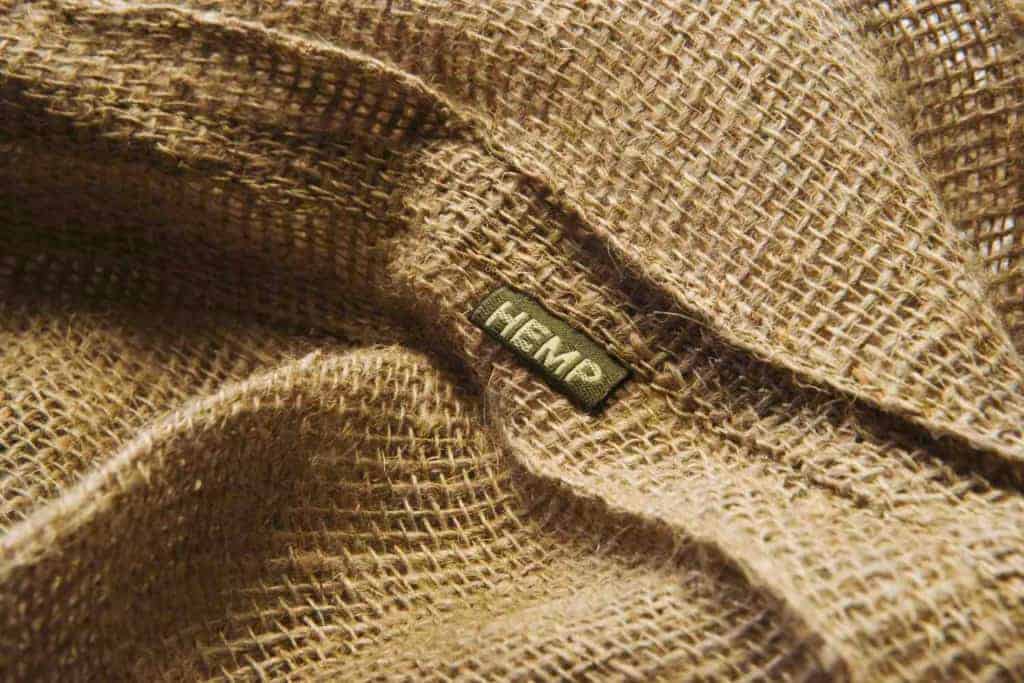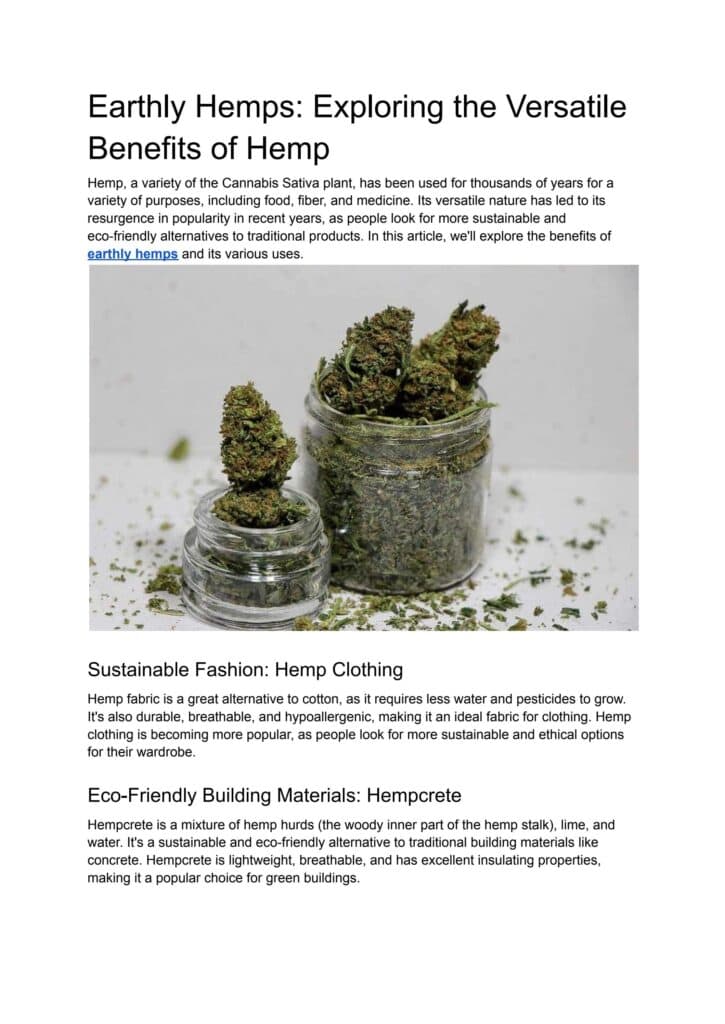You may have heard about the benefits of hemp clothing, but have you ever considered the ethical considerations behind it? With the increasing popularity of sustainable fashion, more and more people are turning to hemp as a eco-friendly alternative to conventional textiles. However, it’s essential to recognize the ethical dimensions associated with its production and consumption. This article aims to shed light on the various ethical aspects of hemp clothing, from its impact on the environment and labor conditions to its potential to promote fair trade practices. So, before you go shopping for that trendy hemp shirt, let’s examine the ethical considerations that come with it.
Environmental Impact
Farming Practices
When it comes to the environmental impact of hemp clothing, one of the key factors to consider is the farming practices involved in its cultivation. Hemp is known for its ability to thrive without the need for synthetic fertilizers or pesticides. It is a fast-growing crop that requires minimal water and has a deep root system that prevents soil erosion. This means that compared to other crops, hemp has a relatively low carbon footprint and does not contribute significantly to water scarcity or soil degradation.
Pesticide Use
Another environmental consideration is the use of pesticides in hemp cultivation. Hemp is naturally resistant to pests and diseases, making it less reliant on chemical pesticides compared to other crops. This is beneficial not only for the environment but also for the health of farmers and surrounding communities. By choosing hemp clothing, you are supporting a more sustainable and pesticide-free agriculture system.
Water Consumption
Water consumption is a crucial aspect of any agricultural practice, and hemp is no exception. The good news is that hemp requires significantly less water compared to other fibers commonly used in the fashion industry, such as cotton. It is a highly efficient crop, able to grow in diverse climates without excessive irrigation. By opting for hemp clothing, you are indirectly reducing water usage and supporting conservation efforts.
Soil Health
The health of the soil is a fundamental component of sustainable agriculture. Hemp has the remarkable ability to rejuvenate and restore depleted soils. Its deep root system helps aerate the soil, increasing its fertility and reducing the need for additional soil amendments. By wearing hemp clothing, you are indirectly supporting regenerative farming practices that prioritize soil health and resilience.
Sustainable Production
Certifications
To ensure the ethical production of hemp clothing, it is important to look for certifications that guarantee sustainable and socially responsible practices. Certain certifications, such as the Global Organic Textile Standard (GOTS) and the Fair Trade Certified label, provide assurance that the fibers used in the clothing are grown and processed in an environmentally and socially conscious manner. These certifications also ensure fair wages and safe working conditions for the farmers and workers involved.
Supply Chain Transparency
Supply chain transparency is a critical aspect of sustainable production. It involves knowing where the materials used in the clothing come from, how they are processed, and who is involved at each stage of the production process. By choosing brands that prioritize transparency, you can be confident that the hemp clothing you purchase was produced under ethical conditions, free from exploitation and environmental harm.
Labor Conditions
Purchasing hemp clothing also raises important considerations regarding labor conditions. It is crucial to support brands that uphold fair labor standards and provide safe working conditions for their employees. By doing so, you are advocating for the well-being and dignity of the workers involved in the production of your clothing. Look for brands that prioritize fair wages, worker empowerment, and human rights throughout their supply chains.
Local Economy Support
Supporting the local economy is another vital aspect of sustainable production. Choosing hemp clothing that is sourced and produced locally can have a positive impact on the communities where the clothing is made. It helps stimulate local economies, creates employment opportunities, and reduces the carbon footprint associated with long-distance transportation. By purchasing locally made hemp clothing, you are directly contributing to the economic well-being of your community.

This image is property of sawatta.com.
Human Rights
Fair Trade
One of the most significant ethical considerations when purchasing and wearing hemp clothing is supporting fair trade practices. Fair trade ensures that farmers and workers receive fair wages and are provided with safe working conditions. By choosing fair trade hemp clothing, you are directly contributing to poverty alleviation and empowering marginalized communities. Look for the Fair Trade Certified label to ensure that the clothing you purchase meets these standards.
Worker Exploitation
Worker exploitation is unfortunately prevalent in the fashion industry, and hemp clothing is not exempt from these concerns. It is essential to be aware of the working conditions and treatment of workers involved in the production of hemp clothing. Opt for brands that prioritize worker well-being and transparency in their supply chains. By making conscious purchasing decisions, you can help combat worker exploitation and promote ethical labor practices.
Living Wages
Ensuring that workers receive living wages is a crucial ethical consideration in the fashion industry. When purchasing hemp clothing, look for brands that prioritize fair compensation for their workers. Living wages allow workers to meet their basic needs and improve their overall well-being, breaking the cycle of poverty. By supporting brands that prioritize living wages, you are contributing to the dignity and empowerment of workers in the fashion supply chain.
Child Labor
Child labor is a significant ethical concern in the production of clothing, and it is important to choose brands that have strict policies against its use. Selecting hemp clothing from brands that prioritize child labor-free practices helps ensure that your clothing is not contributing to the exploitation of children. By making informed choices as a consumer, you can play a role in the eradication of child labor and the protection of children’s rights.
Health Considerations
Chemical Residues
One of the health considerations related to hemp clothing is the presence of chemical residues. Unlike conventional cotton, which is often heavily sprayed with pesticides and herbicides, hemp has a lower likelihood of retaining chemical residues in its fibers. This makes hemp clothing a healthier option for both the wearer and the environment.
Allergenic Potential
Hemp clothing is generally considered hypoallergenic and is a suitable choice for individuals with sensitive skin or allergies. The natural fibers of hemp are less likely to trigger allergic reactions compared to synthetic materials or chemically treated fibers. By choosing hemp clothing, you can enjoy the benefits of a fabric that is gentle on the skin and reduces the risk of skin irritation.
Skin Sensitivity
For individuals with sensitive skin, hemp clothing is a favorable option due to its soft and breathable nature. Hemp fibers are known for their ability to wick away moisture and provide a comfortable wearing experience. If you often experience skin sensitivity or discomfort with other fabrics, opting for hemp clothing may be a great solution to enhance your comfort and well-being.
Dyeing Processes
Dyeing processes in the fashion industry can have a significant impact on both human health and the environment. When choosing hemp clothing, consider brands that prioritize natural and non-toxic dyeing methods. This helps reduce the risk of exposure to harmful chemicals and minimizes pollution in waterways. By supporting sustainable dyeing practices, you contribute to a healthier and more environmentally friendly fashion industry.

This image is property of wiser.eco.
Biodegradability
End of Life Disposal
Biodegradability is an important consideration in the life cycle of clothing. Hemp clothing is naturally biodegradable, meaning it can break down into organic matter without leaving behind harmful pollutants. When your hemp clothing reaches the end of its life, it can be composted or returned to the earth, minimizing waste and contributing to a circular economy.
Waste Reduction
The fashion industry is notorious for its significant contribution to global waste. By opting for hemp clothing, you are choosing a more sustainable alternative that can help reduce waste. Hemp is a highly versatile plant, and nearly every part of it can be utilized, minimizing waste in the production process. Through sustainable production and consumer choices, we can work towards a more waste-free fashion industry.
Microplastic Pollution
One of the pressing concerns in the fashion industry is microplastic pollution. Synthetic fibers, such as polyester and nylon, shed microplastics when washed, contributing to pollution in our oceans and waterways. Hemp clothing, being a natural fiber, does not contribute to microplastic pollution. By wearing hemp clothing, you can minimize your personal contribution to this environmental issue.
Natural Fiber Comparison
When comparing natural fibers in terms of biodegradability, hemp stands out as a sustainable choice. Unlike cotton, which requires extensive water and chemical inputs, hemp can be grown with fewer resources and still produce a high-quality, durable fabric. By choosing hemp over other natural fibers, you are making a conscientious choice that aligns with your commitment to sustainability.
Cultural Impact
Appropriation vs. Appreciation
Cultural impact is an important ethical consideration when it comes to clothing choices. It is essential to distinguish between cultural appropriation and cultural appreciation. Cultural appreciation involves respectfully engaging with and appreciating the cultural significance and practices of different communities. Appropriation, on the other hand, involves borrowing or adopting elements of a culture without proper understanding or respect.
Indigenous Rights
Purchasing and wearing hemp clothing also provides an opportunity to support indigenous rights. Hemp has a rich history and cultural significance in many indigenous communities around the world. By choosing hemp clothing that is sourced and produced in collaboration with indigenous communities, you are supporting their rights and efforts to maintain their cultural heritage.
Cultural Significance
Hemp clothing carries cultural significance in various cultures around the world. From traditional clothing to ceremonial attire, hemp has been used by different communities for centuries. By wearing hemp clothing, you have the opportunity to honor and appreciate the cultural significance associated with this versatile plant.
Sustainability Practices in Different Cultures
Each culture has its own sustainability practices that are worth exploring and learning from. By understanding and appreciating the sustainable practices of different cultures, we can broaden our perspectives and embrace diverse approaches to a more sustainable lifestyle. By supporting brands that are inclusive and collaborative with different cultures, you contribute to a fashion industry that values diversity and sustainability.

This image is property of fashinnovation.nyc.
Animal Welfare
Non-Animal Alternatives
Hemp clothing is a great option for individuals who prioritize animal welfare. Unlike materials derived from animals, such as wool or leather, hemp is a plant-based fiber that does not involve the use of animals. By choosing hemp clothing over animal-derived materials, you can align your fashion choices with your commitment to animal welfare.
Vegan-Friendly Production
For those following a vegan lifestyle, hemp clothing offers a vegan-friendly alternative. Hemp is a plant-based fiber that does not require the use of animals in its production. By supporting brands that prioritize vegan-friendly production methods, you can confidently wear clothing that is aligned with your values and ethics.
Source of Fiber
One of the ethical considerations related to animal welfare is the source of the fiber used in clothing. By choosing hemp clothing, you are selecting a fiber that is derived from the hemp plant, rather than animals. This ensures that your clothing does not contribute to the exploitation or harm of animals often associated with the fashion industry.
Animal Testing
Animal testing is unfortunately still prevalent in some sectors of the fashion industry. By choosing hemp clothing, you can support brands that prioritize cruelty-free practices and do not engage in animal testing. Opting for hemp clothing allows you to make a conscious choice that respects the well-being and rights of animals.
Corporate Responsibility
Brands’ Mission and Values
One of the key considerations in promoting ethical fashion is the mission and values of the brands you choose to support. Investigate the brands’ commitments to sustainability, social responsibility, and transparency. Look for brands that prioritize ethical practices and have a clear mission to make a positive impact on the environment and society.
Transparency in Supply Chain
A transparent supply chain is a vital aspect of corporate responsibility in the fashion industry. Brands that are open and transparent about their supply chain practices demonstrate a commitment to ethical sourcing, fair labor conditions, and environmental sustainability. By supporting brands that prioritize supply chain transparency, you can contribute to a fashion industry that values accountability and sustainability.
Working Conditions for Employees
Corporate responsibility also extends to the working conditions provided to employees. Supporting brands that prioritize fair working conditions, pay fair wages, and create a safe and inclusive workplace environment is crucial. By choosing brands that prioritize the well-being and rights of their employees, you are making a conscious choice to support ethical and responsible business practices.
Social and Environmental Responsibility
Social and environmental responsibility should be at the forefront of brand values. Brands that prioritize social and environmental initiatives contribute positively to the well-being of communities and the planet. From supporting local communities to investing in sustainable practices, choose brands that actively strive to make a difference and promote a more responsible fashion industry.

This image is property of blogger.googleusercontent.com.
Fashion Consciousness
Trends and Fast Fashion
Fashion consciousness involves being aware of the impact of trends and fast fashion on the environment and society. By understanding the environmental and social consequences of constantly changing trends and the rapid production cycle of fast fashion, you can make more informed choices as a consumer. Opt for timeless and versatile pieces, rather than following fleeting trends, to reduce waste and support a more conscious approach to fashion.
Consumption Patterns
Examining our consumption patterns is a crucial aspect of fashion consciousness. Often, we buy more clothing than we need, contributing to overconsumption and excessive waste. Consider a conscious approach to purchasing clothing, focusing on quality pieces that will last, and supporting brands that prioritize durability and longevity. By adopting a more mindful approach to consumption, you can limit your ecological footprint and contribute to a more sustainable fashion industry.
Sustainable Options
The rise of sustainable fashion has brought forth a plethora of eco-friendly options, including hemp clothing. By exploring sustainable options, such as hemp clothing, you have the opportunity to make choices that align with your values and support a more ethical and environmentally friendly industry. Sustainable options offer a range of styles and designs, proving that fashion can be both fashionable and conscious.
Capsule Wardrobe and Versatility
Building a capsule wardrobe and embracing versatility is another aspect of fashion consciousness. By curating a collection of high-quality, timeless pieces that can be mixed and matched, you reduce the need for excessive clothing and contribute to waste reduction. Hemp clothing, with its versatility and durability, can be a key component of a sustainable and stylish capsule wardrobe.
Consumer Awareness
Educational Resources
Consumer awareness is a vital part of making ethical and informed purchasing decisions. Educate yourself about the ethical considerations of different materials and production processes. Explore educational resources and platforms that provide information on sustainable fashion and the impacts of the fashion industry. By increasing your knowledge, you can make choices that align with your values and promote a more sustainable, ethical, and conscious fashion industry.
Labeling and Certification Systems
Labeling and certification systems play a crucial role in helping consumers make informed choices. Look for certifications such as GOTS, Fair Trade Certified, or the Vegan Certification to ensure that the clothing you purchase meets specific environmental and social standards. Labels that provide clear information about the materials used and the production processes can also help you make more sustainable and ethical choices.
Consumer Decision-Making
Consumer decision-making is a powerful tool for promoting ethical fashion. By prioritizing sustainability, fair labor practices, and transparency, you show brands that these values are important to you. Support brands that align with your ethical considerations and advocate for change by demanding accountability and responsibility. Your decisions as a consumer have the power to shape the fashion industry and drive positive change.
Demand for Ethical Products
The demand for ethical products has the potential to drive significant change in the fashion industry. By actively seeking out and purchasing hemp clothing and other ethically produced garments, you signal to brands and retailers that there is a market for sustainable and ethical fashion. Your demand contributes to the growth of this sector and encourages other brands to adopt more ethical practices.
In conclusion, purchasing and wearing hemp clothing presents a range of ethical considerations. From its positive environmental impact to its support for sustainable production and social responsibility, hemp clothing aligns with values related to environmental conservation, human rights, health, biodegradability, cultural appreciation, animal welfare, corporate responsibility, fashion consciousness, and consumer awareness. By choosing hemp clothing, you are making a conscious choice to support a more sustainable and ethical fashion industry while enjoying the many benefits of this versatile and environmentally friendly material.

This image is property of image.isu.pub.
Recent Posts
Discover how bubble hash is rated on a 1 to 6 scale. From texture and color to aroma and potency, learn the key factors that determine the quality of bubble hash. Whether you're a seasoned cannabis...
Looking to learn about the most popular style of hash? This article explores the different types, from traditional to bubble hash, and reveals the people's favorite. Join us on a journey through the...

